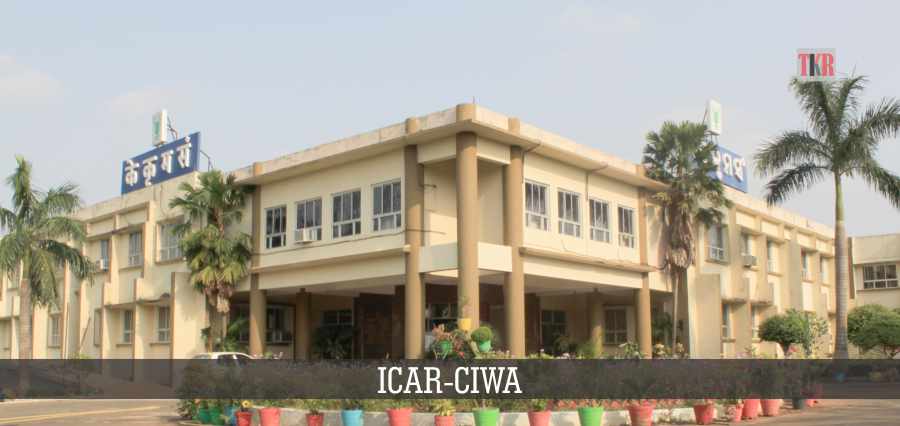The institute aims to disseminate knowledge to promote gender sensitive decision making for enhancing efficiency and effectiveness of women in agriculture.
ICAR-Central Institute for Women in Agriculture (ICAR-CIWA) is an institution first of its kind in India that is exclusively devoted to gender related research in agriculture. It was established as National Research Centre for Women in Agriculture (NRCWA) in April 1996, at Bhubaneswar (Odisha) under Indian Council of Agricultural Research, New Delhi. Keeping in view the role of women in integration of farm and household activities, All India Coordinated Research Project on Home Science (AICRP on HS) started in the 6th Five Year Plan (1980-85) was merged with NRCWA in the year 2007. The NRCWA was further upgraded to the ‘Directorate of Research on Women in Agriculture’ (DRWA) in the year 2008. The Directorate has been upgraded and renamed as ‘ICAR-Central Institute for Women in Agriculture’ (ICAR-CIWA) in the year 2014.
Institute is undertaking research on several issues affecting women and their opportunities in agriculture through participatory action research in different technology based thematic areas involving farm women to test suitability of farm technologies for them and suggest refinement. The Institute is coordinating the AICRP on Home Science (AICRP HS) at 12 centres in 11 states across the country.
About the Director
Dr. S. K Srivastava is the Director of this Institute. He obtained Graduation in Agriculture with First class from Gorakhpur University; and Post-graduation and Doctorate in Agricultural Entomology from CSAUA&T Kanpur. Dr. Srivastava has published more than 170 publications including 47 full length papers in scientific/professional journals, 55 in conference proceedings, 26 compendium/book chapters, 25 popular articles, 8 manuals/teaching aids and 13 research/ extension bulletins.
He served C.S.A.University as a Senior Research Fellow, Research Associate and Jr.Scientist/Assistant Professor of Entomology for about 16 years. Thereafter, he joined this premier Institute as Senior Scientist, Entomology from 2002. He acquired a Diploma in HARDI Spraying course from HARDI International Denmark. He has also attended Advanced International Training Programme at Stockholm and Svalov, Sweden and at Cape Town, South Africa. Dr. Srivastava has been the recipient of many awards including
Best Innovator, Farmers guide and Friend by Hon’ble Minister, Govt. of Uttar Pradesh; Bharat Jyoti Award; AZRA Fellowship Award; Dr Radhakrishnan Gold Medal Award; Bharat Ratna Rajiv Gandhi Gold Medal Award;
State-of-the-art Infrastructure
The Institute has a well-developed Agricultural Knowledge Management Unit, Video conferencing system, Institute Technology Management Unit with necessary facilities for IPR and commercialization of institute’s technologies.
The institute has a conference hall with seating capacity of 150 and two committee rooms with seating capacity of 40 each in addition to well- equipped training hall and with the provision of LCD and other audio visual aids. Technology block also functioning in the Institute campus which has an exhibition cum meeting room with a seating capacity of 300 persons, while the training cum conference hall can accommodate 100 persons.
The Institute has a research farm of 32 acres including 15 acres area under different horticultural and field crops as well as livestock & fisheries. The institute has well developed demonstration units viz; horticulture based cropping models, vermicomposting unit, integrated fish-poultry-duck-unit and ornamental fish unit.The institute also has Trainees hostel, Residential quarters, Women farmers’ hostel, well-equipped laboratories in the field of entomology, ergonomics, post- harvest technology, horticulture, seed technology, animal science, fisheries, and gender data centre.
Major Activities of ICAR- CIWA
The institute’s primary activities include technology assessment and refinement in gender perspective; Management of operational drudgery for farm women; Livelihood and nutritional security of farm families; Gender sensitive extension methodologies; Repository of gender disaggregated data and policy advocacy and Coordination and monitoring AICRP on Home Science. The institute also focuses on Capacity building, Consultancy services, Human Resources Development (HRD), and Collaborative network projects.
The Institute also conducts various national flagship programmes viz;
- Mera Gaon Mera Gaurav
- Tribal Sub Plan programme
- Aspirational Districts
- Swachch Bharat Abhiyan
Achievements and Recognitions
The below mentioned are just a few of the achievements earned by ICAR-CIWA:
- Developed Multi Agency Participatory Extension Model (MAPEM) for promotion of backyard poultry by rural women, Gender sensitive village level para extension worker model to bridge the extension gap between women and development functionaries, Gender and agril. R & D (GARD) framework, Extension model for fish seed production, Resource efficient horticulture model, Gender Knowledge System in Agriculture Portal.
- Developed Low cost women friendly technologies included Hygienic fish drying rack, Fish silage based poultry feed and organic manure, Azolla based poultry feed, Weaning mix for reducing malnutrition, Pot method of vermi composting, maize dehusker cum sheller(commercialized)
- Enhanced crop protection knowledge of 556 farm women of twenty villages of Odisha in Khurda, Puri, Cuttack, and Jagatsinghpur districts through 19 training programmes having knowledge gap (78.4- 95.2%) in the use of seed treatment and bio-pesticides. Farm women are motivated to adopt eco-friendly pest management technologies which resulted in reduction in use of pesticides hazards.
- Popularized gender friendly IPM technologies in 10 agroclimatic zones of Odisha and provided technological support to 896 farmwomen/ farmers
- Developed Gender desegregated database from 27,000 women involved in farming, livestock, post harvesting and other allied activities covering 42 agro-climatic zones of the nine states on participation and decision-making status in agriculture & allied activities
- Nutritional profiling of 3000 adolescent girls out of total sample of 5069 using anthropometry, clinical assessment and haemoglobin estimation.
- Eleven gender friendly new tools were developed, tested and refined
- 49 Entrepreneurs were established for income generation in group and individual mode in different activities.









